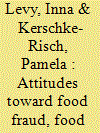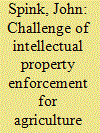| Srl | Item |
| 1 |
ID:
185271


|
|
|
|
|
| Summary/Abstract |
This article examined a model that focused on the association between attitudes towards food fraud (AFF) and such factors as food safety concerns, self-labelling as a victim and national culture. The online survey included 106 German and 363 Israeli respondents and questionnaires on attitudes towards food fraud, food safety concerns, self-labelling as a victim of food fraud, and sociodemographic characteristics. The results indicate that national culture and self-labelling as a victim predict food safety perception, which predicts AFF. The discussion addressed the findings in the context of collective victimisation, exposure to food fraud, and national culture.
|
|
|
|
|
|
|
|
|
|
|
|
|
|
|
|
| 2 |
ID:
105135


|
|
|
|
|
| Publication |
2011.
|
| Summary/Abstract |
One often-overlooked aspect of intellectual property rights (IPR) strategy is the deterrence and enforcement against 'irresponsible defendants' including product counterfeiters. When applied to food, the consumer product fraud or product counterfeiting is referred to as food fraud, or economically motivated adulteration. While this problem is not unique to agriculture and food products, there are special circumstances and issues to consider. The objectives of this paper are to: (1) review the underlying fraud opportunities (complex and on a massive scale), including an exploration of types of fraudsters and types of fraud (near infinite); (2) review how globalization and source economies contribute to the problem; (3) review the complexity and challenges of enforcement for companies and agencies; and (4) introduce the 'chemistry of the crime' or the 'crime triangle', to shift the focus from reactionary intervention and response to proactive prevention. Five applicable case studies are included, bringing insights on the irresponsible nature of many of the fraudsters. Through its review of fraudsters and types of fraud, this study will provide information to assist with IP technology transfers and the effective enforcement of IPR. Product counterfeiting often poses a very serious public health and economic threat to agriculture and food products. There are very motivated, intelligent, resilient and aggressive fraudsters, but they can be deterred by companies or agencies focused on reducing fraud opportunities. Standard business practices-even identified best practices-often inadvertently contribute to fraud opportunities.
|
|
|
|
|
|
|
|
|
|
|
|
|
|
|
|